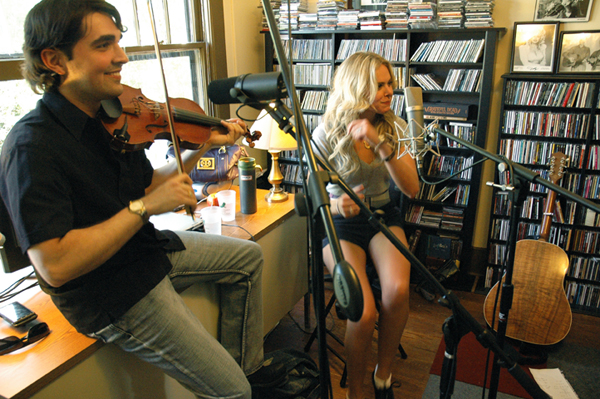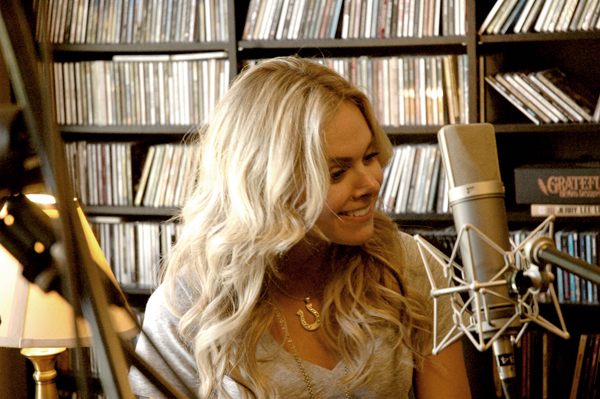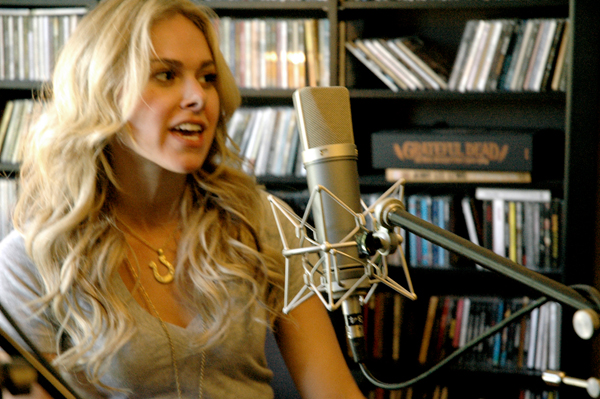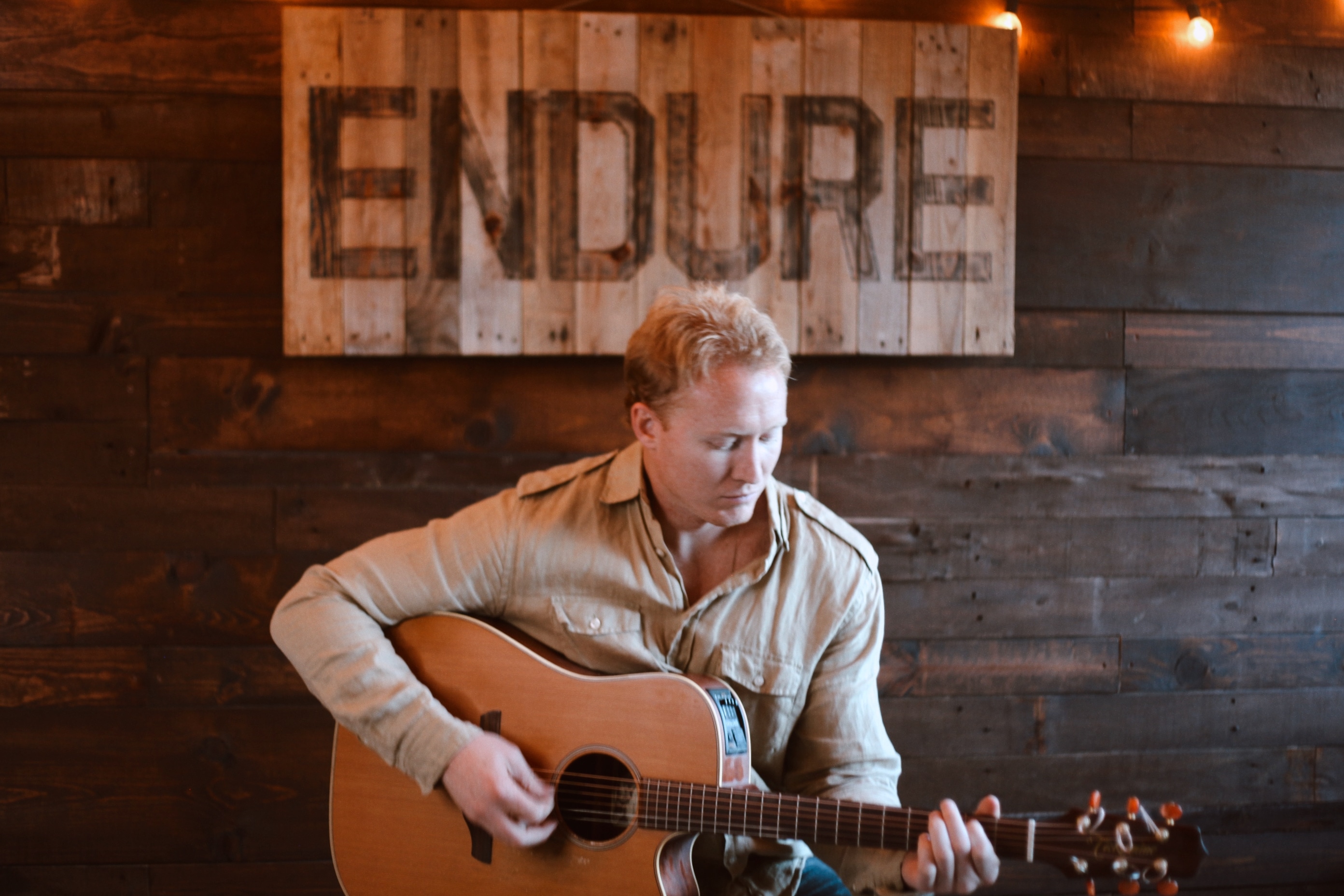Videos by American Songwriter
You may know Laura Bell Bundy from Legally Blonde: The Musical (she played the lead). Or maybe you know her as the up-and-coming country star, with a great new album out, Achin’ And Shakin’. We’ll let Laura describe the concept behind it, which involves some audience participation.
LB: It’s a two-sided album. The first half of the album is all the slow stuff, that’s the Achin’ side. And the Shakin’ side is things like “Giddy On Up” and “Everybody” and these other songs. It’s a little sassier, a little more fun, a little funnier. The other side is pretty depressing [laughs], so whatever mood you’re in.
There’s two booklets, and then there’s drinks that go with each side, and you open this and it says “Achin’: if you’re in the mood to wallow in your sorrows, chill out, make out, drink wine, have folks over, sit at a coffee shop etc.,” listen to this side. And then, drinks for Achin’ are red wine and bourbon. And then, on the Shakin’ side: “if you’re in the mood to shake your junk, work out, run, drive your car fast, getting to go out to get over some jerk and move on!,” listen to this side, and it’s Red Bull and vodka, and beer. Those are the drinks.
Who came up with the concept?
I did. There were a couple of people who really thought it was a great idea and encouraged it and then there were a couple of people who thought it was a horrible idea. Sometimes an idea is risky, sometimes a creative idea can seem very scary and risky, but as soon as you commit to it, everybody follows, and I’ve learned a lot in this process of just committing to it even though it might have been kind of unheard of for a new artist. I kept hearing, “that’s unheard of for a new artist,” and I’m alike, “all the more reason I should do it.”
Your song “Cigarette” is such a catchy song, so great. Are you a smoker?
I’m not.
Do you worry you’re going to get any flack for the song?
I guess I’m kind of encouraging smoking: “I should have left my lipstick on a cigarette.” But there’s a deep meaning in that. I don’t advocate smoking, in fact I actually get headaches when I smell it, but it’s the idea that this person is worse for you than a cigarette. So I should have left my lipstick on a cigarette because putting my lipstick on you, that’s killing me softly.
This is one of those songs where I’m more proud of the second verse than I am the first. The first is setting it up, “I should have stayed lonely, I should have stayed bored and broken, I should have been alright, just for the night.” It’s one of those things; I have time on my hands, I had a little freedom on my hands I went for this. And then the second verse is kind of like an ashes to ashes kind of thing… “I tried to put you out, I tried to clear the air, but I’m breathing your breath as I die a slow death, what burns like a flash, is ashes to ashes.” So, it’s like it’s as quick as I light you up, life is over. Either that or it’s a slow burn, a slow death, so that’s what it is, more than I’m advocating young people go out and smoke cigarettes. But, I would advocate they smoke a cigarette before they do something naughty with a guy they shouldn’t.
It occurred to me as you were singing the song “When it All Goes South” — “going south” is like a simile for something going wrong. And you’re from the South, I assume.
Yes, but I moved from New York. I moved here and I was in a long distance relationship as soon as I moved here, and I wrote it on an airplane. I started the idea of “When it All Goes South” on the airplane, leaving New York and heading back to Nashville. I was just thinking, at the time, we were in a pretty good place in the relationship, but I could just feel the tightening that happens, and the lack of communication, and those things that are hard to manage when you are in two different places. I could almost just predict the end of it, so that was me being sad to leave but also being excited to live in a new place. So there was a double meaning to “When it All Goes South,” literally and figuratively.
It sounds like “Homecoming Queen” is a very personal song for you.
It is. It’s about not needing to be the homecoming queen. I’ve kind of walked to the beat of my own drum. One of the things that I stand for is being true to myself and not judging others for being true to themselves. I think, in that way, this song—people may not hear this and think that, but that’s what it feels like to me.
In the song you sing “just me and Norma Jean, just doing our own thing.” Who’s Norma Jean?
I’ve had kind of an obsession with Marilyn Monroe since I was ten. I have a lot of Marilyn Monroe pictures in my house, and pins, and I have a lot of Marilyn Monroe posters. Between her and Einstein, they’re probably the biggest iconic figures in history that I’m fascinated with. But something about her, there is a kind of a sadness, there’s rockin’ to the beat of your own drum with her, and she created a persona for herself, but who she was at the core was Norma Jean, and she just wanted to be loved. She just wanted to be admired and she searched for love her whole life, but she did her own thing , she didn’t follow normal paths. She didn’t get her way and I might not get my way, but I’ll be okay, because I still count my blessings, you know. There’s something about the vulnerability of her that I really love.
I threw that in there because I was lying on the pillow and it had her face on it while I was writing a song and I had the hook, and I just got a dog and I was trying to find a name for her, and she looks like she has a little eyeliner under her eye. She’s blonde, she’s a Chihuahua, and she’s beautiful. I thought I was going to name her Tammy Faye Bundy, but then I thought it wasn’t fair to name a dog into this world with that name, and I thought, “she kind of looks like Marilyn Monroe!” And Norma Jean, I named my dog Norma Jean. Then I realized I had to write a song, so now when I sing the song, I think about me and Norma Jean doing our thing, just me and my dog, so it has a completely different meaning now.
How was co-writing for the album? Is that a new experience for you?
You know, a little bit. I’ve been in New York, and I did a lot of writing alone, and when I came to Nashville it was about setting appointments to write. A lot of people set up an appointment at 10 a.m. I’m not even up at 10 a.m., let’s be honest. So, to me, writing a song at 10 a.m., that was like, pulling teeth, but I did meet these really amazing people, amazingly talented people. You start to find your groove with people. I’ve always been a fan of, if you’re creatively moved to go in that direction, lyrically, or melodically, you should. And sometimes you get people who are like, “they don’t ever play that on the radio.” That’s why I always set up these co-write situations where I don’t give a crap what they’re going to play on the radio. I don’t care. I want us to write a good song that we feel proud of, whether it’s going to be on the radio or not, and if we just keep doing that, people will be able to connect with it. Otherwise it’s going to be contrived. I don’t want to be contrived, so it was an adjustment, because a lot of the time, I like to be alone when I write my lyrics, I like to have a melody in my head and then take my time to really digest. Sometimes, there’s another person looking at you, waiting for you to come up with a really good lyric, and I just don’t write with those people any more. I just like to write with the people that I feel an ease with, lyrics come like this [snaps]. Then you see a lot of repeat names of co-writers, because I understand who they are as people, I understand who they are as writers, creatively how we jive. So at the end of the day, the co-writing experience for this album was wonderful, was amazing, and I’ve realized that I’ve become a better writer because of the people I’ve written with, and we really allowed ourselves to think outside the box. And there was specific direction, there was some direction to thinking outside of the box, an idea of going a little throw back, throw back country, but also throw back soul, and putting those together, so it defined it a little bit, but lyrically there were no—I remember being in one situation where I was like, “I don’t think they would say that in country music.” And I’m like, “well, I’m from Kentucky, and I’m saying it and I’m putting it in there.”
I’ve got a little chip on my shoulder. I’m not the kind of person to talk about a tractor, because I don’t have a tractor. I mean, I’m from Kentucky, I have a Southern family, a Southern mom and I’ve been through all of those experiences, so those are the things, and as a woman from the South, I’m going to write about things that a woman from the South can relate to, a young woman can relate to.
What were the songs in the Legally Blonde musical like?
It’s interesting, because on Broadway, you are telling a story with music, which is essentially very similar to the way we do it in country music, except you’re telling one story per song in country music, where as with a Broadway show, you’re telling an entire story with seventeen songs. In Broadway, music is about specific motions or specific movements in that long, long, story. So, Legally Blonde has got that theatrical pop thing. There’s something kind of modern, there was something poppy about it. It was almost a theatrical version of Ke$ha [laughs]. Lyrics are much more specific, and specific to a story, on Broadway. They’re more vague for other genres, I think. I liked “So Much Better” a lot, and one called “What You Want.” I always like the songs in the show that have a little bit more soul to them, or stank on them. There’s a song called “Omigod You Guys.” I can’t stand that song. I absolutely can’t stand it.
Why?
It’s annoying. I found the song to be very annoying, and people who go see the show love it and it’s hard for me to tell them, and I of course, grew to love it as a joke. It’s just not my kind of music, I think, like we were saying before, I like the kind that’s got a little soul in it, or R&B. I connect with it more. My father’s from Muscle Shoals, Alabama, which is where a lot of the soul music came from, the rootsy, soul music. Aretha, Otis Redding, some of the Rolling Stones’ stuff was there, but they have a lot of soul. That is a huge influence on me, huge. You hear it a lot more on the Shakin’ side of the album. You know, James Brown riffs. Not your typical country record, that’s for sure.
VIDEO: Laura Bell Bundy performs “When It All Goes South,” “Cigarette,” and “Everyone.”
Stream two more songs below:
[wpaudio url=”https://savageventures-develop.go-vip.net/wp-content/uploads/2010/06/3-Homecoming-Queen.mp3″ text=”Laura Bell Bundy – Homecoming Queen” dl=”0″]
[wpaudio url=”https://savageventures-develop.go-vip.net/wp-content/uploads/2010/06/1-Giddy-Up.mp3″ text=”Laura Bell Bundy – Giddy Up” dl=”0″]
This session was recorded by Steve Martin for American Songwriter.
All photos by Rachel Briggs.















Leave a Reply
Only members can comment. Become a member. Already a member? Log in.